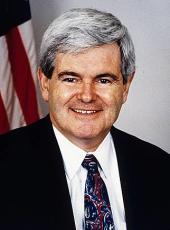
Gingrich Campaign Press Release - Saving America from the Super Committee, Washington Gridlock and Failure
By Newt Gingrich
 The Super Committee is a terrible idea.
The Super Committee is a terrible idea.
Creating a spending axe so stupid it would gut defense and cripple Medicare is a sign of Washington's failure of leadership.
We currently face three strategic choices in our fiscal policy:
First, fantasy and collapse (the Greek model), which seems to be president Obama's model as he wanders around the country making reelection promises with no sense of fiscal responsibility.
Second, austerity and pain, which seems to be the Washington establishment's preferred model. Of course with the highest per capita incomes in the country and the best housing values, the Washington elite are basically immune from the pain that Americans face every day.
There is a third option: Innovation and Growth.
When I was Speaker and working with President Bill Clinton, House Republicans balanced the budget for four straight years. We paid off over $400 billion of federal debt held by the public. This is the only time in modern history that these two feats have been accomplished.
We did not raise taxes.
In fact, we cut them to accelerate economic growth, including the biggest capital gains tax cut in history. The results spoke for themselves: unemployment dropped from 5.6% to 4.2%, and Americans created 11 million new jobs while I was Speaker.
We weren't cheap, we were innovative.
We actually doubled the National Institutes of Health budget while controlling spending and balancing the budget.
We passed the largest entitlement reform of our lifetime. Welfare reform in 1996 brought millions out of poverty, and nearly 2 out of 3 welfare recipients left welfare rolls for work or school.
When I became speaker in January 1995 the Congressional Budget Office projected $2.7 trillion in deficit over the next ten years.
When I left the speakership in January 1999, the same CBO projected $2.3 trillion in surpluses for the next ten years.
That is a $5 trillion swing in our fiscal outlook in four years.
And that was working with a liberal Democrat in the white house.
Based on that experience, I have two procedural and five substantive proposals for the Super Committee.
If they would follow these seven steps they could easily reach their ten-year goal of $1.5 trillion in deficit reduction.
Procedurally there are two key steps.
First, drop the threat of draconian cuts as an excuse to do something destructive or stupid. The current model, with the prospect of $1.2 trillion in automatic cuts if no agreement is reached, will lead to really bad and destructive decisions.
It is as though someone said: "I will be forced to shoot you in the head unless you let me cut off your leg."
This entire threat was created by this Congress and President and can be repealed by the same.
Second, the Congressional Budget Office must be profoundly reformed or simply replaced. It makes projections based on "static scoring," which assumes that every tax hike raises revenues and every tax cut will not spur economic growth, and thus revenues will drop. It is a major reactionary obstacle to intelligent budgeting.
At a minimum all of the CBO's scoring systems have to be opened to public analysis, and a minimum of three private sector scores need to be procured for each topic.
At a maximum, CBO should just be replaced by a system of five outside scores.
In either case, the scores should be analyzed historically and each year the two least accurate projections should be replaced with new applicants.
This approach will lead to what Paul Ryan has called "reality-based scoring."
It is the only way to get to an effective accurate system for budgeting.
On substance, here are five major proposals:
Block Granting Means-Tested Welfare Programs to the States: Block granting Medicaid and other means-tested welfare programs to the states could save up to $3.25 trillion for the federal government and $1.4 trillion for the states over the next decade.
?
New Revenue from Oil and Natural Gas Development and Opening Up Federal Lands for Development: A study released by Wood Mackenzie notes that increasing access to American oil and natural gas could bring in over $800 billion in new government revenues by 2030. ?
Save Billions by Reforming the FDA and Investing in New Research: In the 21st Century Contract with America, I outline his plan to reform the FDA to expedite the time it takes a medical breakthrough to reach a patient, as well as giving a new emphasis to researching and understanding how the human brain works. Independent estimates find that the combined public and private cost of Alzheimer's alone will reach $20 trillion dollars over the next four decades. Making investments today that could delay the onset of the disease by only five years could save between $5 and 10 trillion in both private and public spending between now and 2050.?
Save $5 Trillion Over Ten Years through Lean Six Sigma: Lean Six Sigma is a management technique utilized by companies like Motorola and Boeing to streamline and improve efficiency in their manufacturing processes. If applied across the entire federal government, some estimate it could save $500 billion a year or $5 trillion over a ten-year period.??
Attack Fraud in Medicare and Medicaid: The Center for Health Transformation estimates there is between $70 and $120 billion in fraud annually in Medicare and Medicaid. By employing fraud detection techniques utilized by credit card companies, we could save between $700 billion and $1.2 trillion in the next ten years.
Newt Gingrich, Gingrich Campaign Press Release - Saving America from the Super Committee, Washington Gridlock and Failure Online by Gerhard Peters and John T. Woolley, The American Presidency Project https://www.presidency.ucsb.edu/node/298359
